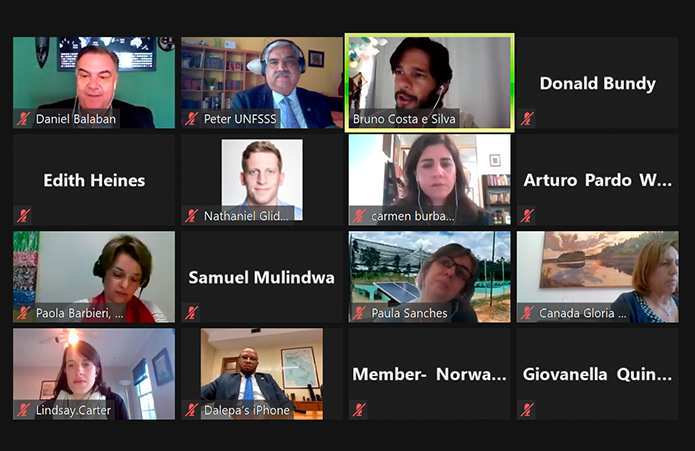
A side-event as part of the 47th edition of the Committee on World Food Security (CFS) brought together practitioners to discuss what has been learned from implementing school feeding programmes around the world throughout the pandemic, and why they remain essential for children’s education, health, nutrition, and communities. The panel, moderated by Carmen Burbano, Director of the WFP School-based Programmes Division, took place on Monday 8th February and registered over 220 people in the audience.
The Brazilian Cooperation Agency (ABC) and the National Fund for Education Development (FNDE) were also present. Paola Barbieri represented ABC at the event and highlighted that the pandemic scenario reinforced the importance of international cooperation. She also spoke of how school feeding programmes were affected and had to be readapted, encouraging joint work between governments and international organizations.
Bruno Costa e Silva, FNDE’s National School Feeding Programme analyst, presented alarming data on the pandemic’s socioeconomical effects in Brazil and emphasized the importance of home-grown school feeding as a social security mechanism. He also detailed the efforts of the Brazilian government to adapt school feeding legislation, a move to guarantee that the programme funds would continue to be used to purchase and distribute food to students, even when the schools are closed. He also cited the case of the Amazonas state, where it is possible to witness municipalities where school feeding is 100% supplied by smallholder farming.
Daniel Balaban, Director of the WFP Centre of Excellence against Hunger Brazil, closed the event. In his remarks, he highlighted the severe impacts the Covid-19 pandemic had on children, with over 390 million of them missing out on school meals, leading to massive implications for students’ learning, health, and nutrition. “The example of Brazil presented by FNDE showed us how the well-established institutional bases of a school feeding programme – from high-level management to the very end of implementation – can facilitate programme adaptation, even in times of adversity. This is an ode to school feeding’s institutionalization and to everything we, as WFP, have been standing for over the years: the importance of creating solid capacities to regulate, manage, deliver, and monitor school feeding”, he said.
He also commended governments, donors, and international agencies for the hard work in responding to this unprecedented challenge. He stressed that it will take a strong coalition to ensure access to meals is restored for children who need them the most, with the participation of the private sector, individuals, multilateral institutions, NGOs, and other sectors.
Examples from Finland, Rwanda and USDA
The event also highlighted school feeding examples from around the world. Finland’s Minister for Development Cooperation and Global Trade, Ville Skinnari, highlighted the country’s 70-year experience with school feeding, which is a key part of the Finish education system. “We know that the benefits of school meals go far beyond a plate of food”, he said, stating also that the meals served in schools meet 1/3 of pupils’ daily requirements. In Finland, the programme is seen as an investment for the future, with high returns in terms of education, health, social protection, and agriculture.
Samuel Mulindwa, Permanent Secretary, Ministry of Education of Rwanda, and Edith Heines, WFP Representative and Country Director, discussed the Government of Rwanda’s recent commitment to scale its home-grown school feeding programme, while reaffirming its importance and highlighting the effects the programme has on communities and smallholder farmers specifically. WFP started supporting school feeding programmes in Rwanda in 2002.
Lindsay Carter, Director of the McGovern-Dole programme (USDA) highlighted the institution’s work to reduce hunger and increase literacy especially among girls through 47 projects in 30 countries. She also stressed that improved health and nutrition practices in schools are also part of school feeding programmes and the need for adaptation and strengthening and expanding programmes across the world.
A recording of the event will be available here soon.




